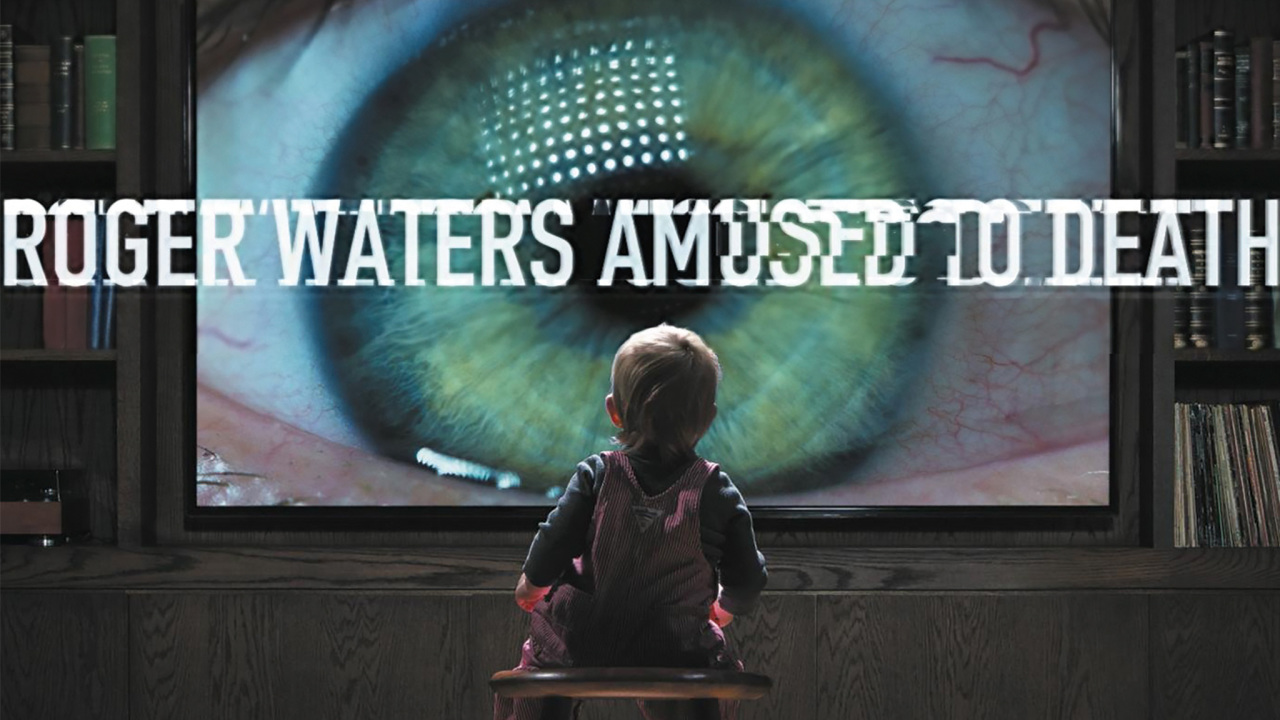In a time when infants routinely stare at tablet screens and an android isn’t just a synthetic human-like organism dreamed up by Philip K. Dick, Roger Waters must be feeling pretty smug about the prescient aspects of 1992’s Amused To Death.
His third solo concept album indicted a screen-obsessed society. It follows a monkey flicking randomly through TV channels, giving Waters the scope to comment with snarling frustration on politics, war, religion and popular culture._ ‘God wants peace, God wants war, God wants famine, God wants chain stores…’_
He has said that along with The Dark Side Of The Moon and The Wall, it’s his finest achievement, and that it’s never received the respect it deserves. Today he declares: “Most of what I had to say then sadly still pertains today… and is maybe even more relevant to our predicament as people in 2015.”
Indeed, if he’d been able to foresee the all-conquering rise of the internet and its stranglehold on our attentions, he’d probably have written an even darker, more bilious attack on the corrosive, mind-numbing power of pixels and megabytes.
He’d started working up material during the 80s, as he toured the Radio K.A.O.S. album. The title – and more, to be harsh but fair – was inspired by the book Amusing Ourselves To Death: Public Discourse In The Age Of Show Business, by Neil Postman. Postman was an American media theorist who pointed out that contemporary life is closer to the visions of Aldous Huxley’s Brave New World (the public is oppressed by bread and circuses, medicated into bliss) than those of Orwell (our rights seized by totalitarian state control). You can imagine Waters reading this, having already given us The Wall, and light bulbs galore popping in his astutely cynical mind.
It gave him the framework in which to draw his diatribes against the Gulf War, Tiananmen Square, profit-based media producers and – rather cattily – Andrew Lloyd-Webber (he thought the impresario had plagiarised Echoes on The Phantom Of The Opera. Not sure why he’d want to flag that up: it diminishes Echoes). Anyway, here he showed no compunction venting against Lloyd-Webber on It’s A Miracle: ‘An earthquake hits the theatre but the operetta lingers/Then the piano lid comes down and breaks his fucking fingers/It’s a miracle.’
The insanity of battle and slavish passivity are gnawed at here.
Around the time of the album’s release, Waters was keen to cite himself as “one of the best five writers to come out of English music since the war” and trumpeted this work as being “extraordinarily well constructed, deep and meaningful and moving and important”. It’s easy to see why snarkier members of the press took umbrage against him, but – again – he can have the last laugh, given this album’s foresight.
Mixing it in Q-Sound (to enhance the sound effects: cars, planes, animals, sleigh bells) seemed like over-egging the pudding back then, but it’s the least its ambition deserves. And you could never accuse Waters of lacking self-belief or the courage to risk pretension. Without such pretension, the world of music would be (now is?) a dull place.
This remastered release comes in multiple state-of-the-art formats, plus vinyl: there’s a 5.1 surround sound remix and a new stereo mix by James Guthrie. This particular chimpanzee finds all that format chat a tad overwhelming, but knows a good, unapologetic concept album when it hits him over the head with its messages.
You sense here that Waters still very much wanted to impress his former fellow Floydeans, to prove a point. Received wisdom is that Waters had the ideas, David Gilmour and co had the music. The Final Cut, for all its popularity, hadn’t dispelled that notion. This, though, shows that Waters could pull together some momentous music too. If it sometimes dips into then-current production pitfalls, its determination transcends.
Eclectic guests on the album include Jeff Beck (offering both Gilmour facsimiles and his own thing), Don Henley, long‑time Madonna collaborator Patrick Leonard, Randy Jackson, Andy Fairweather-Low, Toto’s Steve Lukather and Rita Coolidge, who lock in to the epic, nervy tone.
Waters has never been a great singer but he mainly stays in a low Leonard Cohen register here, and is archly affecting. The insanity of battle, the greed of evangelists and our simian, slavish passivity are nailed and gnawed at. The album swipes at ‘the peeling away of feeling’, and in doing so blood-lets. Once more, then, with feeling…

